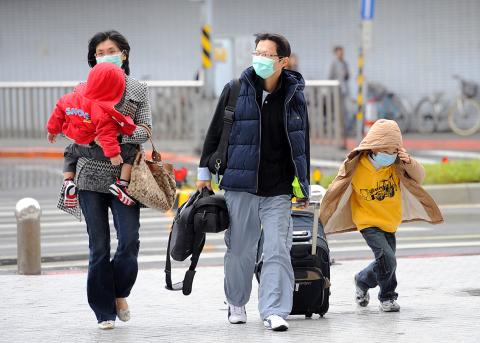About 3 million vehicles hit the roads yesterday on the second day of the Lunar New Year, the day when married daughters return to their parents’ home (Hui Niang Jia), packing several sections of the nation’s highways, the National Freeway Bureau said.
“We estimate that the traffic volume will fall between 2.7 million and 2.9 million vehicle-times,” said Lu Wen-yu (呂文玉), the bureau’s Traffic Management Division vice director, adding that if so, the amount would be 500,000 more than the first day of the Lunar New Year.
The bureau said the first wave of vehicles had been expected to appear from 8am to 12am as some families headed to the homes of wives’ parents, and others headed for amusement parks or recreation areas.

Photo: Luo Pei-der, Taipei Times
Despite the cold, rainy weather in northern Taiwan, vehicles began packing the southbound lanes on the freeways at about 8am, causing average traffic speed to drop to about 30kph at some sections. Traffic congestion between Taoyuan’s Jhongli (中壢) and Neili (內壢), reduced the average speed to as slow as 15kph for a period of time.
Traffic monitoring in the morning showed more cars were heading south, and the congested sections were shortened around midday, the bureau said at noon.
Bureau officials said another wave of cars going north was expected to begin showing up after 3pm.
“We estimate that there will be some waves of cars going north in the afternoon, with sections from Siluo (西螺) to Yuanlin (員林) on Freeway No. 1, from Jhongtou (中投) to Caotun (草屯) on Freeway No. 3, and from Toucheng (頭城) to Pinglin (坪林) Freeway No. 5 being sections that may move slowly,” Traffic Management Division director Hsu Fu-Shen (徐福聲) said.
To ease traffic during the Lunar New Year period, the bureau has implemented toll-free hours between 12am and 7am, and allowed usage of the hard shoulder at more than 20 sections of the freeways.
The bureau estimated that the traffic volume today may even exceed yesterday’s numbers and suggested motorists make use of the toll-free period to get on the freeways before 7am, take alternative roads, or check the online traffic control information before hitting the road, to prevent getting stuck in traffic jams.

Intelligence agents have recorded 510,000 instances of “controversial information” being spread online by the Chinese Communist Party (CCP) so far this year, the National Security Bureau (NSB) said in a report yesterday, as it warned of artificial intelligence (AI) being employed to generate destabilizing misinformation. The bureau submitted a written report to the Legislative Yuan in preparation for National Security Bureau Director-General Tsai Ming-yen’s (蔡明彥) appearance before the Foreign Affairs and National Defense Committee today. The CCP has been using cognitive warfare to divide Taiwanese society by commenting on controversial issues such as Taiwan Semiconductor Manufacturing Co’s (TSMC, 台積電) investments in the

INVESTIGATION: The case is the latest instance of a DPP figure being implicated in an espionage network accused of allegedly leaking information to Chinese intelligence Democratic Progressive Party (DPP) member Ho Jen-chieh (何仁傑) was detained and held incommunicado yesterday on suspicion of spying for China during his tenure as assistant to then-minister of foreign affairs Joseph Wu (吳釗燮). The Taipei District Prosecutors’ Office said Ho was implicated during its investigation into alleged spying activities by former Presidential Office consultant Wu Shang-yu (吳尚雨). Prosecutors said there is reason to believe Ho breached the National Security Act (國家安全法) by leaking classified Ministry of Foreign Affairs information to Chinese intelligence. Following interrogation, prosecutors petitioned the Taipei District Court to detain Ho, citing concerns over potential collusion or tampering of evidence. The

‘COMPREHENSIVE PLAN’: Lin Chia-lung said that the government was ready to talk about a variety of issues, including investment in and purchases from the US The National Stabilization Fund (NSF) yesterday announced that it would step in to staunch stock market losses for the ninth time in the nation’s history. An NSF board meeting, originally scheduled for Monday next week, was moved to yesterday after stocks plummeted in the wake of US President Donald Trump’s announcement of 32 percent tariffs on Taiwan on Wednesday last week. Board members voted to support the stock market with the NT$500 billion (US$15.15 billion) fund, with injections of funds to begin as soon as today. The NSF in 2000 injected NT$120 billion to stabilize stocks, the most ever. The lowest amount it

NEGOTIATIONS: Taiwan has good relations with Washington and the outlook for the negotiations looks promising, Minister of Economic Affairs J.W. Kuo said Taiwan’s GDP growth this year is expected to decrease by 0.43 to 1.61 percentage points due to the effects of US tariffs, National Development Council (NDC) Minister Paul Liu (劉鏡清) said at a meeting of the legislature’s Economics Committee in Taipei yesterday, citing a preliminary estimate by a private research institution. Taiwan’s economy would be significantly affected by the 32 percent “reciprocal” tariffs slapped by the US, which took effect yesterday, Liu said, adding that GDP growth could fall below 3 percent and potentially even dip below 2 percent to 1.53 percent this year. The council has commissioned another institution